- Quick Overview: Typical Software Development Costs in Dubai
- Stage-Wise Breakdown: Where Does the Money Go?
- A Simple Formula to Estimate the Cost of Developing Software in Dubai
- Factors Affecting Software Development Costs in Dubai
- 1. Complexity of Design
- 2. Complexity of Backend Development
- 3. Third-Party Integrations
- 4. Security Measures
- 5. Development Team Size
- 6. Compliance Measures
- 7. Technologies Used
- 8. Complexity of Features
- 9. Hiring Models
- 10. Types of Software
- Hidden Costs of Custom Software Development in Dubai
- Software Maintenance
- Software Hosting
- Legal and Licensing Fees
- Software Promotion and Marketing
- Smart Cost Optimization Strategies for Custom Software Development in Dubai Businesses
- 1. Developing an MVP (Minimum Viable Product)
- 2. Prioritizing Necessary Features
- 3. Leverage Cloud Computing
- 4. Adopt Agile Practices
- Diverse Monetization Strategies for Software in Dubai
- Subscription Model (SaaS)
- Freemium Model
- Perpetual License (One-time Purchase)
- Transaction Fees / Commission-Based
- In-Product Purchases (IAP)
- Advertising (for niche/free solutions)
- Data Monetization (with strict compliance)
- White-Labeling / Reselling
- How to Build Software in Dubai - Cost Breakdown by Development Steps
- 1. Discovery & Planning: Laying the Foundation
- 2. Design: Making It Look Good
- 3. Development: Bringing It to Life
- 4. Testing & QA: Polishing the Product
- 5. Deployment & Launch: Going Live
- 6. Post-Launch Support: Keeping It Running
- How Appinventiv Can Help You Build Secure & Scalable Software
- FAQs
- Q. How much does it cost to develop software in Dubai, UAE?
- Q. How long does it take to develop software?
- Q. What are the benefits of developing software?
- Q. How does the total cost of ownership compare with offshoring?
- Q. What are the compliance and legal considerations for building enterprise software in Dubai?
- Q. How scalable is software built in Dubai for GCC and global markets?
- Q. How much does custom software development cost for enterprises in Dubai?
- Q. What’s included in an enterprise software development cost in Dubai?
- Q. How secure is enterprise-grade software development in the UAE?
- Q. Can Dubai-based agencies build scalable cloud and AI-based enterprise software?
- Q. Build in-house, hire local, or use a hybrid delivery model?
- Q. What do typical petty-cash / small expense-management software development costs look like in the UAE?
Key takeaways:
- Custom software development cost in Dubai in 2026 typically ranges from AED 146,000 to AED 1,800,000 ($40,000–$500,000+), depending on scope, architecture, and enterprise requirements.
- Pricing varies based on feature complexity, backend infrastructure, third-party integrations, cloud hosting, compliance requirements, and security layers.
- Enterprise-grade systems involving AI, automation, or multi-system integration require higher investment due to scalability and governance needs.
- Cost optimization strategies include MVP-first development, phased feature rollouts, cloud-native architecture, and Agile execution models.
- Choosing the right engagement model (fixed scope, time & material, or dedicated teams) significantly impacts overall project cost and ROI.
Software development cost in Dubai in 2026 ranges from AED 146,000 to AED 1,800,000 ($40,000–$500,000+) depending on system complexity, architecture, and enterprise requirements. Businesses in the UAE are increasingly investing in custom software to support digital transformation, automation, and scalable infrastructure.
This guide explains the key cost drivers, development stages, pricing models, and optimization strategies that decision-makers should evaluate before initiating a software development project in Dubai. Whether you are a startup validating a product or an enterprise building a large-scale platform, understanding these variables is critical to budgeting accurately and ensuring long-term ROI.
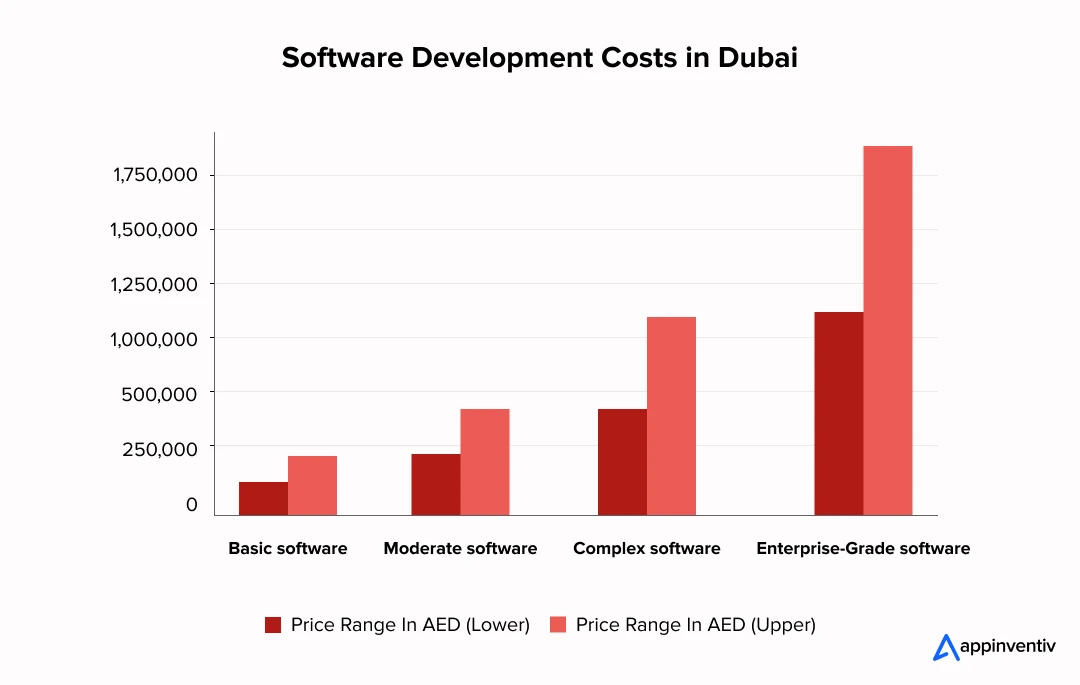
Discuss your project idea with us and get a more precise estimate.
Quick Overview: Typical Software Development Costs in Dubai
Custom software development cost in Dubai in 2026 typically starts at around AED 146,000 ($40,000) for a basic system with limited functionality. Enterprise-grade platforms with advanced integrations, scalable infrastructure, and complex workflows can exceed AED 1,800,000 ($500,000+).
Final investment depends on factors such as system architecture, feature depth, third-party integrations, cloud infrastructure, security requirements, and long-term scalability planning.
The table below provides an estimated cost and timeline breakdown based on project complexity.
| Complexity Level | Features | Cost (AED) | Cost (USD) | Timeline |
|---|---|---|---|---|
| Basic | Standard Security Measures Basic Database Integration Push Notifications | 146,000 to 220,000 | 40,000 to 60,000 | 3 to 6 months |
| Moderate | Advanced Security Features Integration with External APIs Social Media Integration | 220,000 to 440,000 | 60,000 to 120,000 | 6 to 9 months |
| Complex | Robust Security Protocols Real-time Updates | 440,000 to 1,100,000 | 120,000 to 300,000+ | 9 to 12 months |
| Enterprise-Grade | Scalable Architecture Multi-tier Security Systems Integration with Legacy Systems | 1,800,000+ | 500,000 | 12 to 24 months |
Stage-Wise Breakdown: Where Does the Money Go?
When building software, the development process can be divided into several stages, each contributing to the overall cost. From planning to deployment, every phase requires time, resources, and expertise. Understanding where your money goes at each stage can help you manage your budget effectively and make informed decisions. Let’s break down the key stages of software development and the associated costs.
| Development Stage | Estimated Cost in AED | Estimated Cost in USD | Timeline |
|---|---|---|---|
| 1. Discovery & Planning | 7,340 to 36,700 | 2,000 to 10,000 | 1 to 4 weeks |
| 2. Design | 22,020 to 183,500 | 6,000 to 50,000 | 3 to 6 weeks |
| 3. Development | 73,400 to 1,101,000 | 20,000 to 300,000 | 4 to 12 months |
| 4. Testing & QA | 14,680 to 220,200 | 4,000 to 60,000 | 2 to 4 weeks |
| 5. Deployment & Launch | 14,680 to 110,100 | 4,000 to 30,000 | 1 to 2 weeks |
| 6. Post-Launch Support | 14,680 to 146,800 | 4,000 to 40,000 | Ongoing |
| Total | 146,800 to 1,798,300 | 40,000 to 490,000 |
A Simple Formula to Estimate the Cost of Developing Software in Dubai
When estimating the cost of software development in Dubai, you must consider two key factors: the total number of development hours and the hourly rate of the development team. To gain an estimated cost of software development, you should multiply both these elements
Here’s the simple formula to do just that:
| Development Hours × Hourly Rate of Developers = Total Cost |
For example, if your project requires 500 hours of work and if the average hourly rate for developers in Dubai is around 100 AED per hour, the total cost for development would be:
| 500 hours × 100 AED = 50,000 AED |
Factors Affecting Software Development Costs in Dubai
As said above, there are several factors that influence the costs of software development in Dubai. These factors significantly impact the software’s performance and user satisfaction, thus impacting the software development costs in Dubai. Want to learn about these crucial elements in detail? Let’s dive into the software development cost breakdown based on these factors:
1. Complexity of Design
The complexity of design has a significant impact on the cost of building software in Dubai. Crafting a simple interface with minimal customization is less expensive, while an advanced, user-friendly UI/UX adds to the overall budget. Advanced designs often require multiple iterations, detailed user testing, and specialized tools, which contribute to higher expenses.
Cost Comparison Based on Design Complexity
| Design Complexity | Estimated Cost in AED | Estimated Cost in USD |
|---|---|---|
| Basic UI/UX Design | 22,020 – 110,100 | $6,000 – $30,000 |
| Custom/Advanced UI/UX Design | 110,100 – 183,500 | $30,000 – $50,000+ |
2. Complexity of Backend Development
Backend development involves setting up servers, databases, and APIs to ensure smooth software operation. Complex systems that require advanced data handling, real-time updates, or large-scale storage can increase the cost of developing software in Dubai, UAE, due to the time and expertise needed.
3. Third-Party Integrations
Integrating third-party services like payment gateways, social media platforms, GPS, or analytics tools can add to the cost of software development in the UAE. These integrations often require additional licensing fees and extra development time to ensure compatibility and seamless functionality.
Cost Comparison Based on Third-Party Integrations
| Integration Type | Estimated Cost in AED | Estimated Cost in USD |
|---|---|---|
| Basic Integration | 7,340 – 36,750 | $2,000 – $10,000 |
| Complex Integration | 18,350 – 55,050 | $5,000 – $15,000+ |
4. Security Measures
To develop software in Dubai, high-level security measures are crucial, particularly in industries such as finance, healthcare, or e-commerce. Incorporating security measures like encryption techniques, secure login systems, and data protection protocols increases the cost of custom software development in Dubai. Why? Adding these advanced security features requires skilled expertise, resources, time, and rigorous testing.
Cost Comparison Based on Security Measures
| Security Type | Estimated Cost in AED | Estimated Cost in USD |
|---|---|---|
| Basic Security Measures | 18,350 – 29,360 | $5,000 – $8,000 |
| Advanced Security | 55,050 – 367,000 | $15,000 – $100,000+ |
5. Development Team Size
The size of the development team directly affects the software development pricing. A small team or freelancers can be a cost-effective choice, but it often takes longer time to complete the project. Larger teams with technical roles (developers, designers, quality control analysts, project managers) decrease the timeline but increase costs and quality as well.
Here are the estimated hourly rates of development team members.
| Role | Hourly Rate in AED | Hourly Rate in USD |
|---|---|---|
| Project Manager | 91 – 110 | $25 to $30 |
| Tech Lead (Backend/Frontend) | 102 – 110 | $28 to $30 |
| Sr. Software Developer | 91 – 110 | $25 to $30 |
| Backend Developer | 88 – 110 | $24 to $30 |
| DevOps Professional | 91 – 110 | $25 to $30 |
| Business Analyst | 73 – 92 | $20 to $25 |
| UX/UI Professional | 73 – 92 | $20 to $25 |
| QA Professional | 73 – 92 | $20 to $25 |
6. Compliance Measures
Adhering to local and international regulations, such as GDPR, HIPAA, or UAE-specific standards, impacts software development cost models. Compliance adherence requires additional documentation, testing, and often legal consultations to ensure the software meets required standards.
Also Read: How to Build GDPR-Compliant Software for Your Business?
7. Technologies Used
Incorporating advanced technologies such as machine learning, blockchain, AR/VR, or artificial intelligence innovations in Dubai can increase software development costs. These technologies require specialized expertise and involve higher licensing fees for certain tools or APIs.
Cost Comparison Based on Tech Stack and Technologies
| Technology | Explanation | Estimated Cost in AED | Estimated Cost in USD |
|---|---|---|---|
| Basic Tech Stack (HTML, Java, Python) | Standard stack for general-purpose software. Lower complexity, wide usage. | 183,500 to 440,400 | $50,000 to $120,000 |
| Advanced Tech Stack (AI, Blockchain) | Requires specialized knowledge, advanced algorithms, and deeper integration. | 440,400 to 917,500 | $120,000 to $250,000+ |
| Artificial Intelligence (AI) | Involves machine learning, complex algorithms, and data processing expertise. | 440,400 to 917,500 | $120,000 to $250,000+ |
| Augmented Reality (AR) / Virtual Reality (VR) | Needs specialized design, advanced graphics, and 3D rendering integration. | 440,400 to 917,500 | $120,000 to $250,000+ |
| Internet of Things (IoT) | Involves integrating hardware, sensors, communication protocols, and backend. | 440,400 to 917,500 | $120,000 to $250,000+ |
| Cloud Integration | Ensures scalability and data storage but requires cloud service expertise. | 220,200 to 552,000 | $60,000 to $150,000 |
| Blockchain Technology | Requires cryptographic expertise, distributed ledger knowledge, and security. | 440,400 to 917,500 | $120,000 to $250,000+ |
8. Complexity of Features
The average cost of custom software development in Dubai increases with the number and complexity of features. Basic functionalities, such as user authentication or simple UI/UX, can be less expensive, while advanced features, like real-time tracking and AI-driven demand forecasting, demand greater development time and expertise, thus increasing costs.
Cost Comparison Based on Features
| Feature Category | Feature Name | Estimated Cost in AED | Estimated Cost in USD |
|---|---|---|---|
| Basic Features | User Authentication Simple UI/UX Design Push Notifications Basic Database Integration | 7,340 to 14,680 | 2,000 to 4,000 |
| Moderate Features | API Integrations Multi-platform Compatibility Social Media Integrations Enhanced UI/UX Design | 22,020 to 55,200 | 6,000 to 15,000 |
| Advanced Features | Real-Time Tracking AI/ML Integrations Geo-location/Maps Integration Advanced Analytics & Reporting | 55,200 to 137,800 | 15,000 to 37,500 |
| Enterprise Features | Real-time Demand Forecasting Complex Multi-tier Security Blockchain Integration High Availability & Scalability | 137,800 to 367,500 | 37,500 to 100,000 |
9. Hiring Models
The cost depends on whether you hire an in-house team, freelancers, or outsource to a development agency. In-house teams are often more expensive due to overhead costs, while outsourcing to skilled developers in Dubai or abroad can be more cost-effective.
Cost Comparison Based on Different Hiring Models
| Hiring Model | Pros | Cons | Estimated Cost in AED | Estimated Cost in USD |
|---|---|---|---|---|
| In-house Team | Ideal for businesses needing full control over development | High upfront and ongoing costs | 110,200 to 552,000 | $30,000 to $150,000 |
| Freelancers | Best for small-scale or specific development tasks | Risk of delays and inconsistent quality | 22,020 to 110,200 | $6,000 to $30,000 |
| Outsourcing | Suitable for end-to-end app development with diverse expertise | Higher cost compared to freelancers | 55,200 to 220,200 | $15,000 to $60,000 |
10. Types of Software
It is the type and functionalities of your software that determine the cost. Different types of software, such as mobile apps, enterprise software, embedded software, or SaaS, etc, have different development requirements. Thus, they all impact the cost of software development in Dubai differently. For instance, the MVP software development cost in Dubai falls between AED 36,750 and AED 220,200, while enterprise software development in Dubai costs around $500,000.
Cost Comparison Based on Software Types
| Software Type | Best Suited For | Cost in AED | Cost in USD |
|---|---|---|---|
| MVP development | Startups, businesses with limited budgets | 36,750 to 220,200 | 10,000 to 60,000 |
| Enterprise Software | Large enterprises | 220,200 to 1,840,000 | 60,000 to 500,000 |
| Custom Software | Niche industries | 146,800 to 1,101,000 | 40,000 to 300,000 |
| SaaS Products | Startups and scalable solutions | 146,800 to 366,800 | 40,000 to 100,000 |
| ERP Software | Manufacturing and retail | 183,500 to 1,101,000 | 50,000 to 300,000 |
| CRM Software | Sales-driven businesses | 146,800 to 366,800 | 40,000 to 100,000 |
| HR Software | Businesses of all sizes | 146,800 to 366,800 | 40,000 to 100,000 |
| Inventory Management Software | Retail, warehouses, and logistics | 146,800 to 366,800 | 40,000 to 100,000 |
| Educational Software | Schools and trainers | 146,800 to 366,800 | 40,000 to 100,000 |
Hidden Costs of Custom Software Development in Dubai
Now you are well aware of the upfront factors impacting the cost of custom software development in Dubai. But do you know that there are various hidden elements too that can impact your budget? Yes, there are some hidden factors you must be aware of to calculate the overall cost of software development in Dubai. Let’s explore these overlooked expenses so that you can plan your project accordingly and avoid surprises later.

Software Maintenance
Software maintenance encompasses the ongoing updates, bug fixes, performance enhancements, and adaptation to new operating system versions or evolving market demands. These regular tasks are vital to ensuring the software remains functional, secure, and competitive.
Software Maintenance costs typically range from 15-20% of the initial development cost annually, depending on the complexity and scale of the software.
Software Hosting
Hosting costs are essential for storing and managing your software’s data on servers. Leveraging cloud hosting platforms such as AWS, Azure, or Google Cloud offers flexibility and scalability, but they come with ongoing monthly fees based on storage, bandwidth, and usage. As your user base grows, these costs increase significantly, particularly for data-heavy applications.
Legal and Licensing Fees
Legal and licensing expenses are integral to the software development lifecycle. These include securing trademarks, ensuring compliance with data protection regulations, and obtaining licenses for third-party tools or technologies. Neglecting these legal requirements can lead to costly penalties, potential lawsuits, or delays in the software’s release or operation.
Software Promotion and Marketing
No matter how good the software you develop, it will not generate a lucrative ROI if it fails to meet the targeted audience. For increasing your audience reach, you should have a solid marketing strategy. Not to mention, an effective promotion and marketing plan adds to the overall cost of custom software development in Dubai
We can help!
Smart Cost Optimization Strategies for Custom Software Development in Dubai Businesses
You might have gotten overwhelmed uncovering the various upfront and hidden cost-determining factors. But worry not! Here is the good news. You can efficiently reduce development costs while ensuring top-notch quality by following some foolproof strategies. Yes, you read that right. By using the right development approach, you can reduce unnecessary expenses.
1. Developing an MVP (Minimum Viable Product)
Start by building a Minimum Viable Product that includes only the core functionalities required to meet user needs. This approach allows you to launch quickly, gather user feedback, and refine the software over time. This helps reduce initial costs and the risk of overinvesting in unnecessary features.
Strategic Methods:
- Start with a clear understanding of your target audience’s pain points to shape the core functionalities.
- Use rapid prototyping techniques to quickly validate your ideas before committing to full-scale development.
- Keep the design simple and focused, offering just enough features to showcase the app’s potential.
- Establish key performance indicators (KPIs) early to measure the MVP’s success and gather actionable insights.
2. Prioritizing Necessary Features
Focus on implementing features that provide immediate value to users and align with your business goals. Avoid overloading the software with non-essential functionalities during the initial phase, as these can inflate development costs and delay the launch.
Strategic Methods:
- Conduct market research to identify which features will resonate most with your audience and meet their immediate needs.
- Focus on core functionalities that drive user engagement, such as ease of use and essential tools.
- Use feedback loops from early users to continuously reassess and prioritize features that add the most value.
- Implement modular design to allow for easy addition or modification of features without disrupting the app’s core structure.
3. Leverage Cloud Computing
Utilizing cloud computing services streamlines software development by offering scalable infrastructure, enhanced security, and reduced operational costs. Cloud-based solutions enable businesses to develop, deploy, and manage applications more efficiently while ensuring high availability and performance.
Strategic Methods:
- Choose cloud platforms that provide cost-effective storage, computing power, and managed services to optimize resource utilization.
- Implement a hybrid or multi-cloud approach to enhance flexibility and avoid vendor lock-in, ensuring cost-effective scalability.
- Leverage cloud-native tools for automation, security, and performance monitoring to optimize development efficiency and reduce maintenance costs.
- Utilize serverless computing where applicable to minimize infrastructure overhead and pay only for the resources used.
4. Adopt Agile Practices
Adopting Agile methodologies accelerates software development by promoting iterative progress, continuous feedback, and adaptability. This approach enhances collaboration, reduces development risks, and ensures that the final product aligns with business objectives.
Strategic Methods:
- Implement Scrum or Kanban frameworks to enhance team productivity and streamline project management.
- Focus on incremental releases, allowing for early testing, user feedback, and iterative improvements to reduce rework and associated costs.
- Utilize agile with DevOps practices to integrate continuous integration and deployment (CI/CD), ensuring faster software delivery and higher quality.
- Encourage cross-functional collaboration to improve efficiency and responsiveness to changing project requirements.
Also Read: How to Hire an Agile Software Development Team
Diverse Monetization Strategies for Software in Dubai
Building software is one thing; making it profitable is another. In Dubai’s dynamic market, turning your creation into a steady income stream requires smart strategies. Here’s how software gets monetized:
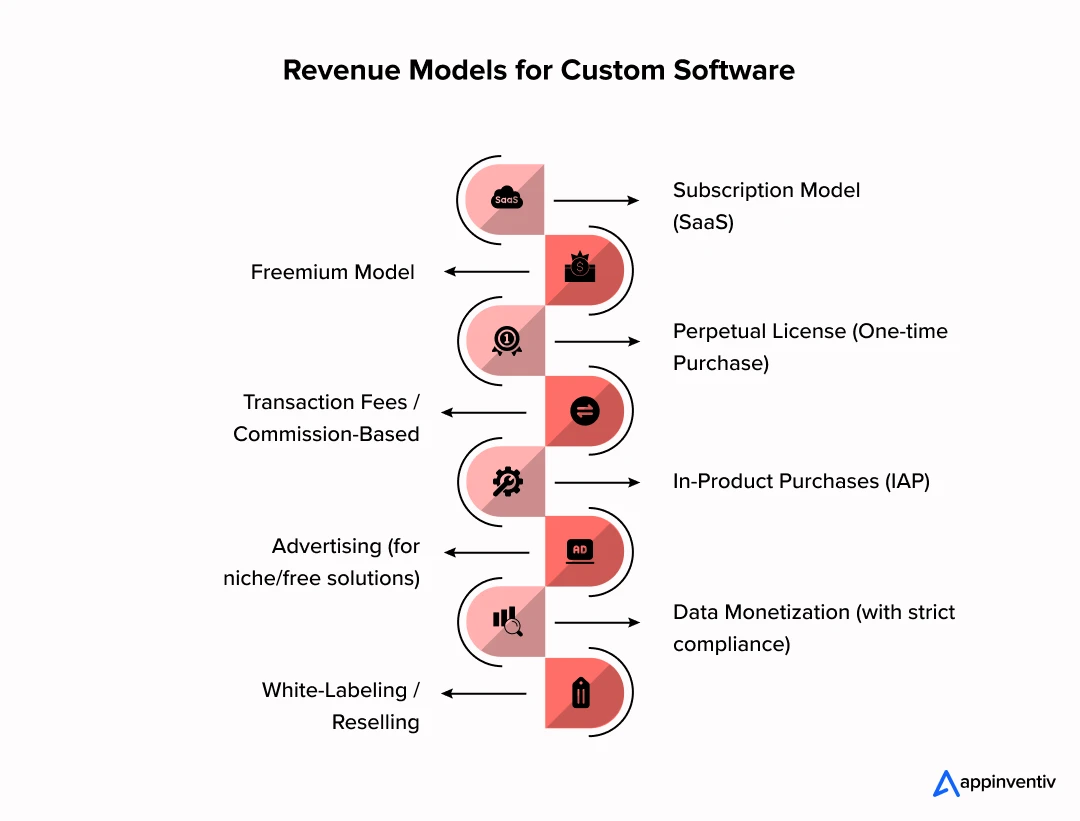
Subscription Model (SaaS)
This is paramount. Users pay a regular fee—monthly or annually—for access. Cloud-hosting is typical. It offers predictable, recurring revenue. This aligns perfectly with the UAE’s digital transformation. You can offer tiered pricing: Basic, Pro, Enterprise, varying by features or usage.
Freemium Model
Offer a free version of your software with limited features or usage. Ask for a paid upgrade to access advanced functionalities or higher limits. This strategy is great for user acquisition. It builds trust, allowing users to experience value before committing money.
Perpetual License (One-time Purchase)
Customers pay a single, upfront fee. They then own and use the software indefinitely. An optional annual fee usually covers support and updates. This still holds relevance for some on-premise enterprise solutions. It suits businesses preferring outright ownership.
Transaction Fees / Commission-Based
The software facilitates a transaction. Examples include marketplaces or booking platforms. The provider then takes a percentage or fixed fee from each successful transaction. Dubai’s robust e-commerce and logistics sectors present significant opportunities.
Also Read: How Much Does Logistics Software Development Cost In Dubai, UAE
In-Product Purchases (IAP)
Allow users to buy additional features or content directly within enterprise software. This enables granular monetization, meaning businesses only pay for specific modules, integrations, advanced reports, or extra user seats as needed. It ensures users acquire precisely what they require, aligning costs with specific functionalities.
Advertising (for niche/free solutions)
Revenue comes from displaying targeted ads within the software. A large user base is essential for this to work. Less common for core enterprise software, but feasible for free tools. Ensure ads are transparent and relevant.
Data Monetization (with strict compliance)
Anonymized, aggregated user data can be analyzed. This data can then be sold as insights. Or it can improve other products. This must strictly follow UAE PDPL and privacy laws. Dubai’s data-driven focus offers potential here.
White-Labeling / Reselling
Develop a core software product. Then license it to other companies. They brand it as their own. The developer receives a bulk licensing fee or recurring royalties. Useful for robust solutions adaptable to various clients or industries.
How to Build Software in Dubai – Cost Breakdown by Development Steps
Building software in Dubai requires a structured approach, and understanding the costs upfront can save you from some significant surprises down the road. I’ve broken this down into the actual steps you’ll go through during the software development process:
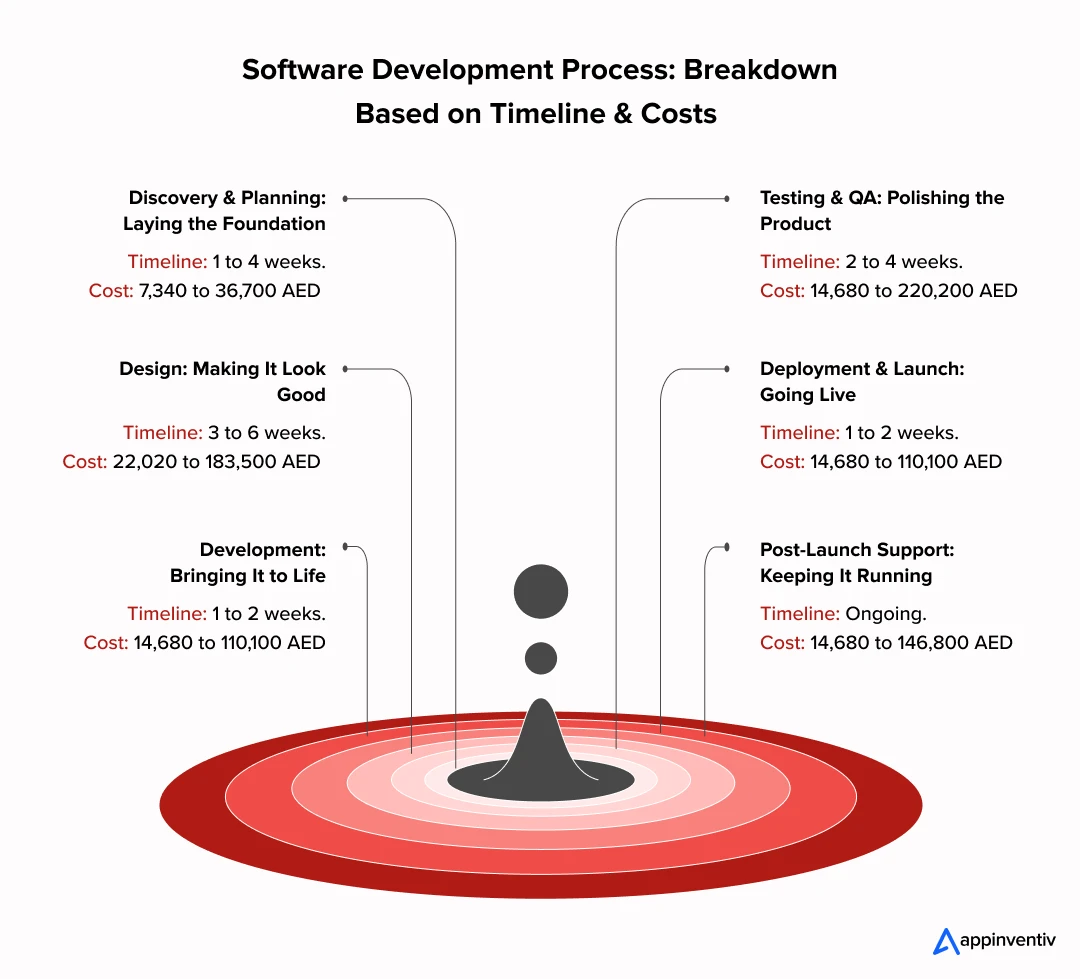
1. Discovery & Planning: Laying the Foundation
Every great software starts with a solid plan. This is where you sit down with your team to map out your idea. What’s the software supposed to do? Who’s it for? This phase involves market research, defining features, and sketching out a roadmap. It’s like plotting a road trip before you hit the gas.
- What’s Involved: Requirement analysis, feasibility studies, and creating a project scope.
- Timeline: 1 to 4 weeks.
- Cost: 7,340 to 36,700 AED (2,000 to 10,000 USD).
2. Design: Making It Look Good
Now that you’ve got a plan, it’s time to make your software easy on the eyes. This step is all about creating wireframes, mockups, and a user interface that feels intuitive. Dubai’s design talent is top-notch, blending global trends with local flair to craft intuitive visuals.
- What’s Involved: UI/UX design, prototyping, and user testing.
- Timeline: 3 to 6 weeks.
- Cost: 22,020 to 183,500 AED (6,000 to 50,000 USD).
3. Development: Bringing It to Life
This is the heart of the process where coders turn your vision into reality. Developers write the code, integrate databases, and build the features you dreamed up. Dubai’s tech hub status means you have access to skilled programmers, but quality comes at a price.
- What’s Involved: Front-end and back-end development, API integration, and coding core functionalities.
- Timeline: 4 to 12 months.
- Cost: 73,400 to 1,101,000 AED (20,000 to 300,000 USD).
4. Testing & QA: Polishing the Product
Nobody wants a buggy product. Testing and quality assurance (QA) ensure your software runs smoothly across devices and scenarios. This step catches glitches, optimizes performance, and makes sure your users have a seamless experience.
- What’s Involved: Functional testing, performance testing, and user acceptance testing.
- Timeline: 2 to 4 weeks.
- Cost: 14,680 to 220,200 AED (4,000 to 60,000 USD).
5. Deployment & Launch: Going Live
It’s showtime! Deployment involves putting your software on servers, app stores, or wherever it needs to live. This phase includes final tweaks and ensuring everything’s ready for the spotlight.
- What’s Involved: Server setup, app store submission, and launch preparations.
- Timeline: 1 to 2 weeks.
- Cost: 14,680 to 110,100 AED (4,000 to 30,000 USD).
6. Post-Launch Support: Keeping It Running
The launch isn’t the finish line. In fact, the real struggle starts after the deployment. Post-launch support covers updates, bug fixes, and maybe even new features based on user feedback. It is like keeping your software in tip-top shape.
- What’s Involved: Bug fixes, minor updates, and ongoing maintenance.
- Timeline: Ongoing.
- Cost: 14,680 to 146,800 AED (4,000 to 40,000 USD).
Just budget smart and partner with us to shape your dream into reality!
How Appinventiv Can Help You Build Secure & Scalable Software
Estimating the software development costs in Dubai is just half of the battle; the real challenge lies in finding the right software development company in Dubai. This is where Appinventiv comes in. With a proven track record of delivering 3000+ successful projects, we stand tall as a trusted tech partner, offering a unique blend of expertise, innovation, and affordability to make your project shine.
Still unsure about our unmatched excellence in secure and scalable software development? Well, let’s get a glimpse at some of our head-turning aspects:
- Streamlined Development Process: We follow an organized and agile development process to deliver high-quality software solutions on time and within budget.
- Team of 1600+ Skilled Professionals: Our team comprises experienced developers, designers, and strategists who bring their expertise to create robust and scalable software.
- Advanced Technology Implementation: From AI and blockchain to IoT and cloud computing, we harness cutting-edge technologies to build future-ready software.
- Market-Aligned Solutions: We align your software with Dubai’s fast-evolving market trends to ensure its relevance and long-term success.
- Proven Success Stories: We have helped major brands in the Middle East, such as IKEA, KFC, and Adidas, as well as startups like JobGet and Vyrb, achieve significant growth and funding.
- Focus on Compliance and Security: We ensure your software complies with Dubai’s regulatory standards while incorporating advanced security measures to protect your data.
Partner with Appinventiv Dubai to bring your software idea to life with unmatched expertise and excellence in Dubai’s thriving tech ecosystem.
FAQs
Q. How much does it cost to develop software in Dubai, UAE?
A. The cost of software development in Dubai typically ranges from AED 146,000 to AED 1,800,000 ($40,000 to $500,000) or more, depending on several factors.
For instance:
- Basic software: AED 146,000 to 220,000 ($40,000 to $60,000)
- Moderate software: AED 220,000 to 440,000 ($60,000 to $120,000)
- Complex software: AED 440,000 to 1,100,000 ($120,000 to 300,000+)
- Enterprise-Grade software: AED 1,800,000 ($500,000+)
To gain an in-depth understanding of the cost variables, please refer to the above blog.
Q. How long does it take to develop software?
A. The timeline for software development typically ranges from 4 to 18 months, depending on the project’s complexity.
- Small business software: 4-6 months
- Mid-complex level software: 6-12 months
- Enterprise-grade software: 12+ months
Q. What are the benefits of developing software?
A. Developing software offers several key benefits:
Tailored Solutions: Custom software is designed to meet your specific business needs, providing a solution that is aligned with your objectives and processes.
Enhanced Efficiency: Software can automate repetitive tasks, streamline workflows, and improve overall operational efficiency, saving time and reducing human error.
Scalability: As your business grows, custom software can be scaled to accommodate increasing demands, ensuring long-term support for expansion.
Competitive Advantage: Developing unique software helps your business stand out in the market, providing features or functionalities that competitors may lack.
Cost Savings: While the initial investment may seem high, custom software can reduce long-term operational costs by improving efficiency and reducing the need for manual intervention.
Improved Customer Experience: Custom software can be tailored to provide a more user-friendly interface, enhancing customer satisfaction and engagement.
Q. How does the total cost of ownership compare with offshoring?
A. While offshoring might offer lower initial development salaries (3-4x cheaper), its Total Cost of Ownership (TCO) can be higher due to communication issues, quality control challenges, higher project management overhead, and potential IP risks. Dubai-based development has higher hourly rates but often results in lower TCO due to better communication, quality, local market alignment, and stronger IP protection.
Q. What are the compliance and legal considerations for building enterprise software in Dubai?
A. Key compliance and legal considerations include:
- UAE Personal Data Protection Law (PDPL)
- Cybercrime Law
- AML-CFT laws for financial transactions
- Economic Substance Regulations (ESR) for local presence.
Sector-specific regulations (e.g., DHA for healthcare) and cloud data residency rules also apply.
Q. How scalable is software built in Dubai for GCC and global markets?
A. Software built in Dubai can be highly scalable. This is because Dubai development firms often use modern technology stacks, prioritize cloud-native development (AWS, Azure, Google Cloud have strong UAE presence), focus on robust architecture, and are adept at multi-language/localization for GCC and global markets. Scalability depends heavily on design, not just location.
Q. How much does custom software development cost for enterprises in Dubai?
A. The cost of building enterprise software in Dubai can range significantly depending on complexity and features. On average, the enterprise software development costs in Dubai can range from 1,100,000 AED to 1,840,000 AED ($300,000 to $500,000) or more.
Q. What’s included in an enterprise software development cost in Dubai?
A. Comprehensive cost typically includes discovery and requirements analysis, UI/UX design, architecture and technical design, actual software development (coding), quality assurance (QA) and testing, project management, deployment and launch, cloud infrastructure setup, security implementation, compliance integration, and documentation. Ongoing support and maintenance are usually separate.
Q. How secure is enterprise-grade software development in the UAE?
A. Enterprise-grade software development in the UAE is highly secure. This is driven by strict UAE regulations (PDPL, Cybercrime Law), the availability of advanced cloud infrastructure, growing cybersecurity talent, adherence to international standards (like ISO 27001, OWASP Top 10), and a focus on secure coding practices and regular security audits.
Q. Can Dubai-based agencies build scalable cloud and AI-based enterprise software?
A. Yes, definitely. Dubai is a hub for AI and cloud adoption. Local agencies have strong expertise in cloud architecture (leveraging major cloud providers), AI/ML model development, data science, and integrating these technologies into enterprise solutions. The government’s push for digital transformation further supports these capabilities.
Beyond standard enterprise software, companies investing in AI software development in Dubai gain access to cutting-edge capabilities, including predictive analytics, intelligent automation, and machine learning-powered decision support systems.
Q. Build in-house, hire local, or use a hybrid delivery model?
A. For Dubai, a hybrid wins: local product/compliance leadership + nearshore/offshore engineering for velocity and unit economics. Appinventiv runs exactly this model from Dubai with global delivery, giving you on-ground governance plus scalable execution.
Q. What do typical petty-cash / small expense-management software development costs look like in the UAE?
A. At Appinventiv, developing a petty-cash or expense-management software solution in the UAE typically starts from AED 120,000–150,000+, with costs varying based on features, integrations, and compliance needs.


- In just 2 mins you will get a response
- Your idea is 100% protected by our Non Disclosure Agreement.
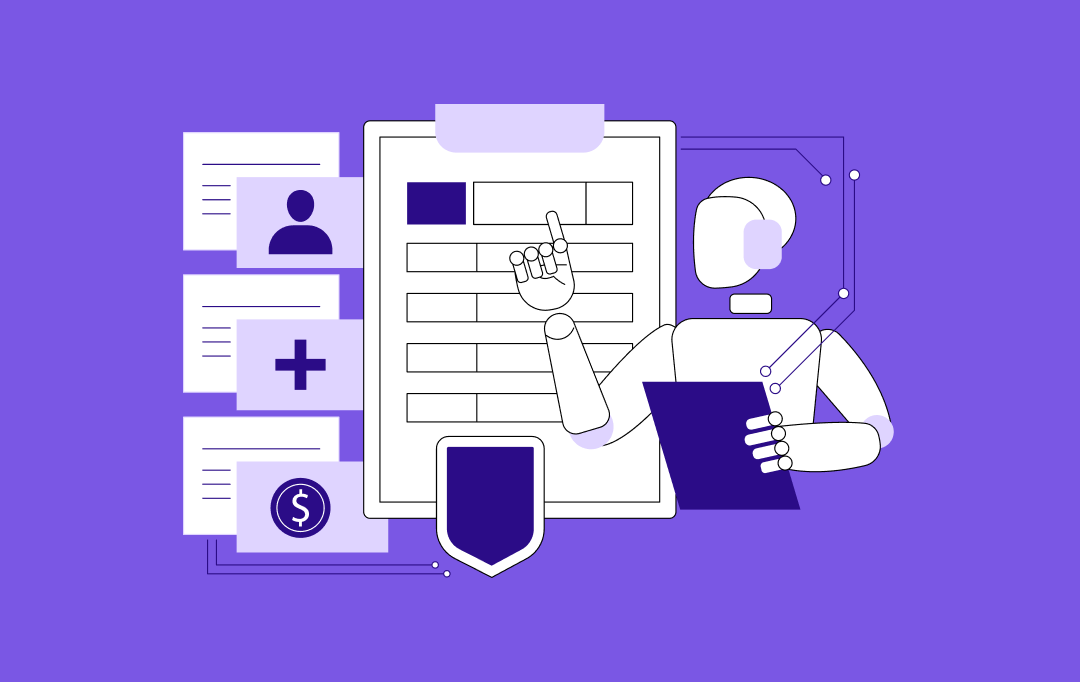
The ROI of Strategic Insurance Technology Consulting for Legacy Modernization
Key takeaways: Insurance technology consulting delivers ROI only when modernization is tied to real workflows, not system replacement. Most legacy modernization failures stem from weak ROI definition and tracking, not from technology limitations. The strongest returns come from reduced operational friction, faster change cycles, and tighter claims and underwriting control. Delaying modernization incurs hidden costs…

Key Takeaways Use a scorecard-driven RFP and a technical assessment to compare vendors on capability, compliance, and delivery risk. Local partners provide regulatory and cultural alignment; hybrid teams often pair that with offshore cost efficiency. Start with a scoped pilot or MVP, milestone-based contracts, and clear IP/SLAs to reduce procurement risk. Require demonstrable security controls,…
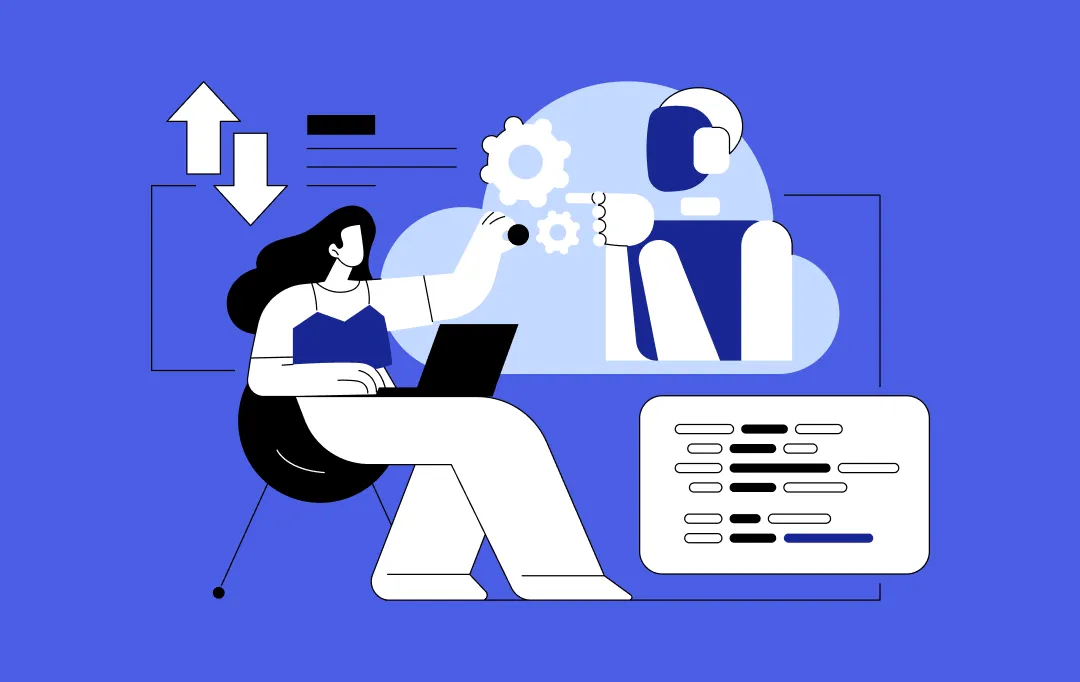
A Strategic Framework for Proof of Concept Software Development
Key takeaways: Most enterprise PoCs fail due to a lack of decision clarity, not technical feasibility or innovation potential. A disciplined PoC framework reduces delivery risk before budgets, teams, and timelines are committed. Enterprise-grade PoCs validate feasibility, compliance, and scale assumptions under realistic operating constraints. Clear success metrics and governance turn PoCs into reliable inputs…





































